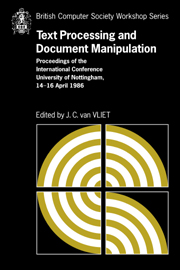 Text Processing and Document Manipulation
Text Processing and Document Manipulation Book contents
- Frontmatter
- Contents
- Preface
- The Design of Lucida®: an Integrated Family of Types for Electronic Literacy
- Tabular Typography
- A Simple Mechanism for Authorship of Dynamic Documents
- VORTEXT: VictORias TEXT reading and authoring system
- An Approach to the Design of a Page Description Language
- Intelligent Matching and Retrieval for Electronic Document Manipulation
- A Disciplined Text Environment
- Semantic Guided Editing: A Case Study On Genetic Manipulations
- Trends and Standards in Document Representation
- Textmaster – document filing and retrieval using ODA
- Combining Interactive Document Editing with Batch Document Formatting
- Formatting Structure Documents: Batch versus Interactive?
- Advanced Catalogue Production at Unipart
- Legibility of Digital Type-fonts and Comprehension in Reading
- An Overview of the W Document Preparation System
- Grif: An Interactive System for Structured Document Manipulation
- Procedural Page Description Languages
- A Strategy for Compressed Storage and Retrieval of Documents
- CONCEPT BROWSER: a System for Interactive Creation of Dynamic Documentation
- An Integrated, but not Exact-Representation, Editor/Formatter
- An Annotated Bibliography on Document Processing
- Systems used
Legibility of Digital Type-fonts and Comprehension in Reading
Published online by Cambridge University Press: 05 May 2010
- Frontmatter
- Contents
- Preface
- The Design of Lucida®: an Integrated Family of Types for Electronic Literacy
- Tabular Typography
- A Simple Mechanism for Authorship of Dynamic Documents
- VORTEXT: VictORias TEXT reading and authoring system
- An Approach to the Design of a Page Description Language
- Intelligent Matching and Retrieval for Electronic Document Manipulation
- A Disciplined Text Environment
- Semantic Guided Editing: A Case Study On Genetic Manipulations
- Trends and Standards in Document Representation
- Textmaster – document filing and retrieval using ODA
- Combining Interactive Document Editing with Batch Document Formatting
- Formatting Structure Documents: Batch versus Interactive?
- Advanced Catalogue Production at Unipart
- Legibility of Digital Type-fonts and Comprehension in Reading
- An Overview of the W Document Preparation System
- Grif: An Interactive System for Structured Document Manipulation
- Procedural Page Description Languages
- A Strategy for Compressed Storage and Retrieval of Documents
- CONCEPT BROWSER: a System for Interactive Creation of Dynamic Documentation
- An Integrated, but not Exact-Representation, Editor/Formatter
- An Annotated Bibliography on Document Processing
- Systems used
Summary
ABSTRACT
Two experiments were conducted to investigate the effects of font-styles on legibility and on reading proficiency. The font-styles studied include Letter Gothic, Courier, and DECwriter font. Both upper and lower case letters were studied. The results revealed the significant effects of different font-styles, ambiguities between letters, and method of presentation. Directions for future research were suggested.
Introduction
Advances in computer technology have brought many new methods of conducting research in typesetting and typography. One area which benefits a lot from the use of modern computers is related to type-font design and evluation. With the aid of a computerized optical scanner, characters in different font styles can be read and converted into digital images. Once these images have been binarized [Suen 1986], they can be stored in matrices and reproduced easily by computers and matrix and laser printers. Hence it is not surprising to see that digital fonts have become more and more widely used in the computer environment. While these binary matrices can be stored and used later for printing, they form a new tool to study several subjects in typography such as legibility of font styles, reading speed/comprehension and font style, spacing of words and texts on the page, line lengths and character sizes. These topics have been of great interest to many psychologists and others (see e.g. Burt 1959, Tinker 1963, Hartley et al 1983). Using modern equipment, these topics can be studied much more rigorously and efficiently than before due to the fact that many parameters such as font styles, character shapes, exposure time, presentation speed, format and spacing, etc.
- Type
- Chapter
- Information
- Text Processing and Document ManipulationProceedings of the International Conference, University of Nottingham, 14-16 April 1986, pp. 178 - 187Publisher: Cambridge University PressPrint publication year: 1986
